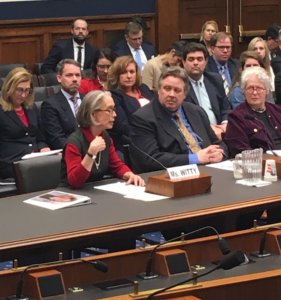WASHINGTON – Mothers Against Drunk Driving (MADD) today renewed its challenge to the auto industry to embrace passive drunk driving prevention technology and support federal legislation to mandate the lifesaving systems in all new vehicles.

In a statement for a House Energy and Commerce Subcommittee on Consumer Protection and Commerce hearing on automotive technologies, MADD noted that in March 2019 before the same subcommittee, then-MADD National President Helen Witty called on auto manufacturers and suppliers to make drunk driving prevention technology “commercially available … as soon as possible.”
Two years later, MADD’s research has identified 241 examples of existing technologies that could help prevent drunk driving; the MADD findings were provided to the National Highway Traffic Safety Administration (NHTSA) in response to a Request for Information. Getting this technology on all new cars is long overdue, said MADD National President Alex Otte and Rana Abbas Taylor of Michigan, whose sister, Rima, brother-in-law Issam, nephew Ali and nieces Isabella and Giselle were killed in a wrong-way drunk driving crash in January 2019.
“MADD has learned a great deal about existing drunk driving prevention technology advancements over the past two years,” Otte said. “Just last week, we provided NHTSA with more than 200 examples of driving and driver monitoring and alcohol detection systems that can lead to the elimination of drunk and impaired driving. We are certain the industry has the capability to do this.”
Legislation is now pending before the Consumer Protection and Commerce subcommittee that sets a timetable for NHTSA to require drunk driving prevention systems as standard equipment in passenger vehicles. The bipartisan HALT (Honoring Abbas Family Legacy to Terminate Drunk Driving) Act, which is named in honor of Abbas Taylor’s family, was introduced in March by Congresswomen Debbie Dingell (D-MI) and Kathleen Rice (D-NY) and Congressman David McKinley (R-WV). Similar legislation was approved by the full House last year as part of a comprehensive surface transportation bill.
Otte and Abbas Taylor called on the members of the Alliance for Automotive Innovation to support the HALT Act and the Senate RIDE Act, proposed by Senators Ben Ray Luján (D-NM) and Rick Scott (F-FL).
“We applaud the leadership of the three HALT Act sponsors, Committee Chairman Frank Pallone (D-NJ) and Subcommittee Chair Jan Schakowsky (D-IL),” said Abbas Taylor. “With the continued support of this panel – and we hope the auto industry – this legislation will save many thousands of lives every year, keep families whole, and avert unnecessary suffering throughout the United States. The peril we face is not taking the steps to fully embrace this lifesaving technology that has the promise to eliminate drunk driving once and for all.”
In addition to MADD, legislation to require advanced drunk driving prevention technology is supported by the National Safety Council, Advocates for Highway and Auto Safety, the Governors Highway Safety Association, the Distilled Spirits Council of the United States, the Foundation for Advancing Alcohol Responsibility and Anheuser Busch.
For more information on the HALT and RIDE Acts, visit madd.org/HALT/RIDEAct.
About Mothers Against Drunk Driving Founded in 1980 by a mother whose daughter was killed by a drunk driver, Mothers Against Drunk Driving® (MADD) is the nation’s largest nonprofit working to end drunk driving, help fight drugged driving, support the victims of these violent crimes and prevent underage drinking. MADD has helped to save more than 400,000 lives, reduce drunk driving deaths by more than 50 percent and promote designating a non-drinking driver. MADD’s Campaign to Eliminate Drunk Driving® calls for law enforcement support, ignition interlocks for all offenders and advanced vehicle technology. MADD has provided supportive services to nearly one million drunk and drugged driving victims and survivors at no charge through local victim advocates and the 24-Hour Victim Help Line 1-877-MADD-HELP. Visit www.madd.org or call 1-877-ASK-MADD.

